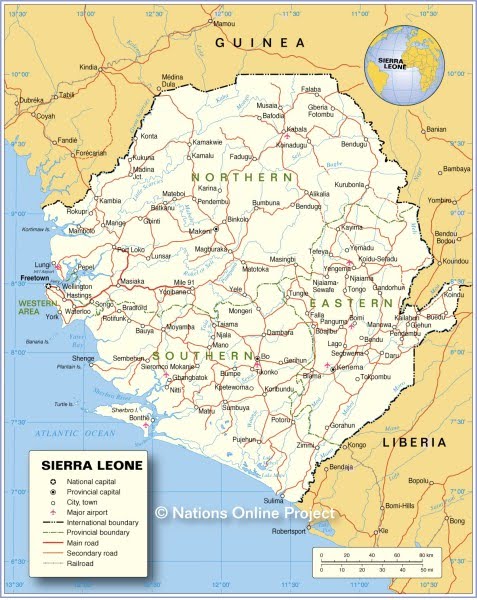
Aw di bodi? Freetown, 18 November 2009
Today the United Nation’s Population Fund has announced that there are now one billion people living on the continent of Africa. Here in Sierra Leone, one of the smallest of Africa’s 62 nations, it is common to hear two people greeting one another in Krio with the words Aw di bodi? In English, “how are you?” and with the reply being, Di bodi na bad, how usef? (I’m fine how are you?) Such a familiar social interaction struck me as having resonance with the Methodist Church’s poster “The Body of Christ has AIDS” and to prepare us to re visit one the Methodist Church’s projects in Wellington, to the East of Freetown.
Our previous visit had been a year ago in the company of two very close friends. It was easy to recall the location of the centre, on the ground floor of a church manse, in a dynamic but economically challenged small town, where artisans and informal commercial trading are all part of the social fabric of delapidated homes and new construction sites. The roads, largely of earth with remnants of tar macadam, are pot- holed and declined into being just tracks for those on motorbikes or foot. Wellington is a very impoverished community that is nevertheless, home to an invaluable HIV/AIDS initiative for people who are HIV positive.
It had been agreed that aspects of both Janice’s and my own job description would include work relates to the church’s commitment of HIV/AIDS; for Janice, with special reference to the centre and for myself, the teaching of studies on HIV/AIDS at the theological college. It was therefore valuable to initiate both of our contributions, with an understanding of how preventive education, testing and counselling function in Sierra Leone society today. Part of this included discovering if our own bodies were HIV positive or not and undergoing the testing programme at the centre, which included pre–test and post – test counselling.
Idrisa Songo is the Director of the PLHA (People living with AIDS) project which is but one of four Methodist Church HIV/AIDS initiatives. It is the largest in the country for PLHAs, with some 400 clients across greater Freetown. Idrisa explained that whilst the modest centre is a focal point for nurses, social workers and volunteers, the work of home based care happens elsewhere. Nevertheless the number of PLHA who visit the centre and access its services are clearly closely attached to its supportive environment and the empathy and solidarity offered in making a regular visit.
The project funding comes largely from Christian Aid and the Global Fund for AIDS, TB and Malaria, but I was more than surprised that the budget for staff salaries, including the director, three nurses/counsellors, two social workers, two administrative officers and the stipends for twenty volunteers and the delivery of extensive home based care programme is a mere £62,000 per annum. It is therefore not surprising that in discussion with a group which included staff, volunteers and clients , it was possible to identify several areas where the project was struggling to reach the goals and desired standards of care that many hoped would be integral to the project. One such example was to ensure that social workers and volunteers would be provided with basic medication, hygiene and nutrition kit, that would prevent opportunistic infections and assist food security for those who are clinically affected and confined to their homes.
As World Aids Day approaches, I trust that the concerns of the 40 million bodies that are infected with HIV and the countless millions more who are affected will feature in your prayers.

No comments:
Post a Comment